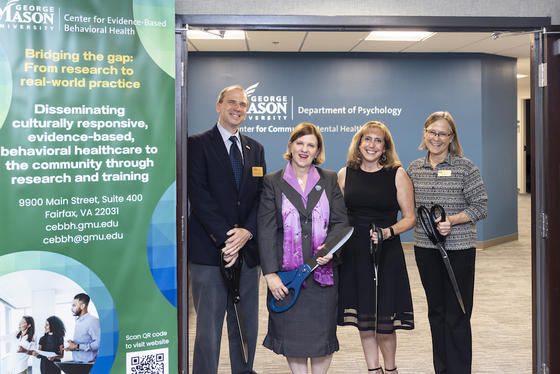On Friday, Oct. 27, George Mason University’s College of Humanities and Social Sciences and Department of Psychology hosted a grand opening of its new facility for the Center for Community Mental Health and Center for Evidence-Based Behavioral Health, two centers whose research and community services are deeply connected to strengthening our communities.

The new City of Fairfax location at 9900 Main Street is optimally located to enable community members’ easy access to critical mental health services, while also providing space to advance research and train the next generation of behavioral health providers.
The Center for Community Mental Health serves as the main training clinic for Mason doctoral candidates in clinical psychology, as well as students in other behavioral health disciplines such as counseling and social work. The center provides state-of-the-art, accessible, affordable, and culturally sensitive therapy and testing services to those in need, regardless of income. It is one of the only sites in the mid-Atlantic to offer therapies and testing on a sliding scale, which enables access to care for as low as $5 per session. The center sees children as young as age 5, and works with community members across the lifespan, including addressing the mental health needs of veterans.
“At the Center for Community Mental Health, we firmly believe that mental health services should be available to everyone, regardless of ability to pay,” said Robyn Mehlenbeck, the center’s director. “We also believe you should receive help when you need it and not be told you’ll need to wait three or four months.”
To meet community need, the center has expanded staffing for its emotional support lines to 12 hours a day every day in both English and Spanish, Mehlenback said. Three session skills treatment plans are also available with little to no waitlist, as a bridge to longer term services, she added.
Last year, the Center for Community Mental Health provided more than 2,100 therapy sessions, completed 118 evaluations and more than 315 evaluation sessions, and helped train 77 undergraduates and 57 graduate students—all with a commitment to the community.
Mason’s Center for Evidence-Based Behavioral Health is committed to decreasing barriers to accessing high-quality mental health care. Serving as a critical bridge between research on the best therapies and real-life applications, it offers training and consultation to the community’s behavioral health workforce in culturally responsive, research-based, behavioral health treatments. The Center for Evidence-Based Behavioral Health has trained approximately 430 clinicians and clinical supervisors, who represent eight local county-based organizations and 38 private behavioral health organizations, over the last year alone.
“The Center for Evidence-Based Behavioral Health brings together Mason faculty, with different areas of expertise, to partner with and train behavioral health providers in research-based therapies,” said Christy Esposito-Smythers, CEBBH Director. “This helps our current workforce address gaps in training, learn new treatment techniques, and further enhance their ability to effectively treat clients with a variety of behavioral health concerns.”
“Mental health and behavioral health are health care. We need to change the conversation to remove both the stigma and the barriers to these critical services,” said City of Fairfax Mayor and Mason alum Catherine Read. “Mason is taking a leadership role in developing a model for quality affordable mental health services while training the next generation of mental health care providers. Fairfax City is the beneficiary of this groundbreaking effort to invest in the holistic well-being of an entire community. We are fortunate in our proximity and partnership with Mason.”
“The behavioral health needs in our community are acute, as are the behavioral health workforce development needs in the region,” said Ann Ardis, College of Humanities and Social Sciences dean. “This new facility will provide Mason faculty and students with a state-of-the-art environment in which to pursue research-to-practice activities in service to our communities.”
The Center for Community Mental Health’s Emotional Help Line provides free, anonymous, confidential support in both English (703-215-1898) and Spanish (703-914-3878). The line is open daily from 8:30 a.m. to 8:30 p.m.
Related News
- September 8, 2025
- May 22, 2025
- May 9, 2025
- April 16, 2025
- November 22, 2024
